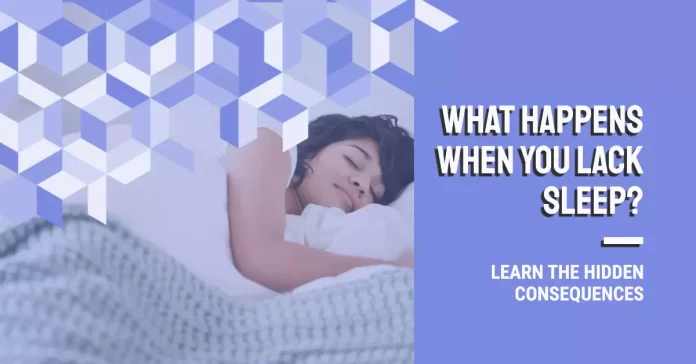We’ve all experienced those nights when sleep evades us, leaving us tired and weary the next day. Let’s explore the world of sleep deprivation and discover the unexpected toll it takes on your body and mind.
The Domino Effect on Your Body
When you don’t get enough shut-eye, it’s like setting off a chain reaction in your body. Your body’s immune system weakens, increasing your vulnerability to illnesses. Ever notice how you catch a cold more readily after a sleepless night? Blame it on your exhausted immune system.
The Mental Maze
Lack of sleep isn’t just about physical fatigue; It also tricks your mind. Your cognitive functions take a hit, affecting memory, concentration, and decision-making. Navigating a maze with foggy glasses feels frustrating and challenging.
Mood Swings and Emotional Rollercoaster
Did you feel irritable or unusually emotional after a sleepless night? Sleep deprivation messes with your emotions, leading to mood swings and heightened sensitivity. Your usual easygoing self might turn into a cranky version you barely recognize.
Weighty Matters
Surprisingly, lack of sleep can impact your waistline. The hunger hormones get out of whack, making you crave sugary and carb-loaded foods. Hello, midnight snacks and unhealthy cravings!
The Stress Connection
Lack of sleep heightens stress levels, creating a vicious cycle where stress disrupts your sleep and sleep deprivation intensifies stress. When disrupted, your body and mind struggle to recharge, placing stress at center stage due to lack of downtime.
Beauty Sleep
They don’t call it “beauty sleep” for nothing. Your skin takes a hit when you skimp on sleep. Dark circles, puffy eyes, and a dull complexion become your not-so-glamorous companions.
Long-Term Consequences
Chronic sleep deprivation isn’t just a one-night problem; it can lead to serious health issues. Increased risk of heart disease, diabetes, and a compromised immune system are just a few potential long-term consequences.
Conclusion
In a world that glorifies hustle culture, it’s crucial to understand the genuine cost of sacrificing sleep. The effects of sleep deprivation are profound, impacting both physical health and mental well-being. Before you contemplate burning the midnight oil again, pause for a moment of reconsideration. Your body and mind deserve the rejuvenation that only a good night’s sleep can provide. Sweet dreams!
Frequently Asked Questions (FAQs)
Is it possible to make up for lost sleep during the weekend?
While a weekend nap may offer temporary relief, it doesn’t fully compensate for consistent sleep loss. Establishing a regular sleep pattern and ensuring adequate nightly rest is crucial for overall well-being.
How many hours of sleep should I target per night?
Adults generally need 7-9 hours of sleep per night for optimal health. However, individual needs may vary.
Will one night of poor sleep have a significant impact?
Occasionally, forgoing an entire night’s sleep can impact your mood and cognitive function the next day, but it generally doesn’t present a long-term concern.
Can technology use before bedtime contribute to sleep problems?
Yes, the blue light emitted by devices can interfere with your body’s natural sleep-wake cycle. It’s advisable to limit screen time before bedtime.
How can I improve my sleep quality?
Establishing a consistent sleep schedule, developing a relaxing bedtime routine, and ensuring that your sleep environment is comfortable and conducive to rest are essential for promoting healthy sleep.
Does caffeine consumption impact sleep?
Yes, caffeine is a stimulant that can distort sleep. Limiting caffeine intake, especially in the hours before bedtime, is advisable.
Does insufficient sleep contribute to weight gain?
Insufficient sleep can disturb hunger hormones, causing heightened cravings for unhealthy foods and potential weight gain.
Is it normal to dream more when experiencing sleep deprivation?
After experiencing sleep deprivation, REM (rapid eye movement) sleep, linked with dreaming, intensifies.
How does stress impact sleep, and vice versa?
Stress can lead to difficulty falling asleep, and lack of sleep can increase stress levels. Establishing stress-management techniques can positively influence sleep.
Does sleep deprivation cause consequential health conditions?
Researchers have linked chronic sleep deprivation to various health issues, including cardiovascular problems, diabetes, and a weakened immune system.










